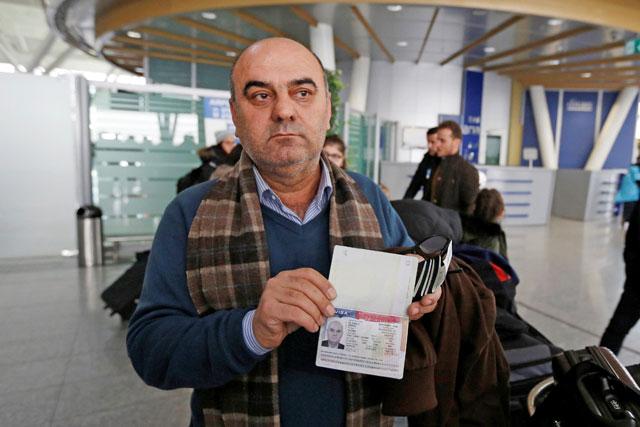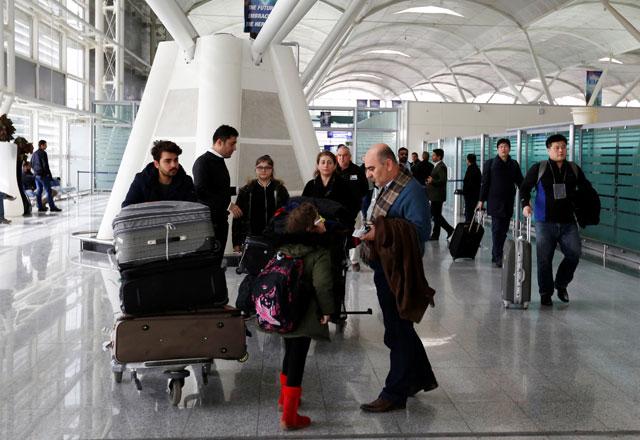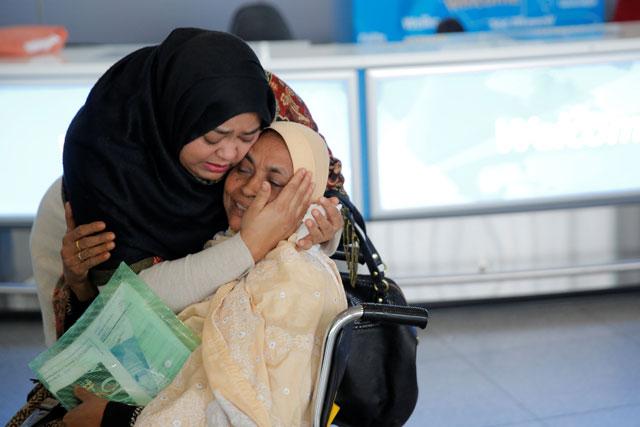You are here
Global backlash grows against Trump’s immigration order
By Reuters - Jan 29,2017 - Last updated at Jan 29,2017

Fuad Sharef Suleman shows his USA visa to the media after returning to Iraq from Egypt, where he was prevented from boarding a plane to the US at Erbil International Airport, Iraq, on Sunday (Reuters photo by Ahmed Saad)
BAGHDAD/CAIRO — A global backlash against US President Donald Trump's immigration curbs gathered strength on Sunday as several countries including long-standing American allies criticised the measures as discriminatory and divisive.
Governments from London and Berlin to Jakarta and Tehran spoke out against Trump's order to put a four-month hold on allowing refugees into the United States and temporarily ban travellers from Syria and six other Muslim-majority countries. He said the move would help protect Americans from terrorism.
In Germany — which has taken in large numbers of people fleeing the Syrian civil war — Chancellor Angela Merkel said the global fight against terrorism was no excuse for the measures and "does not justify putting people of a specific background or faith under general suspicion", her spokesman said.
She expressed her concerns to Trump during a phone call and reminded him that the Geneva Conventions require the international community to take in war refugees on humanitarian grounds, the spokesman added.
Merkel’s sentiments were echoed in Paris and London; “Terrorism knows no nationality. Discrimination is no response,” said French Foreign minister Jean-Marc Ayrault, while his British counterpart Boris Johnson tweeted: “Divisive and wrong to stigmatise because of nationality.”
Along with Syria, the US ban of at least 90 days affects travellers with passports from Iran, Iraq, Libya, Somalia, Sudan, Syria and Yemen, including those with dual nationality that includes one of those countries.
Trump said his order, which indefinitely bans refugees from Syria, was “not a Muslim ban”, though he added he would seek to prioritise Christian refugees fleeing the country.
Washington’s Arab allies, including the Gulf states and Egypt, were mostly silent.
The government in Iraq, which is allied with Washington in the battle against the Daesh terror group and hosts over 5,000 US troops, also did not comment on the executive order.
But some members of the parliament said Iraq should retaliate with similar measures against the United States.
Iran vows to respond
In Baghdad, influential Shiite cleric Moqtada Al Sadr said American nationals should leave Iraq, in retaliation for the travel curbs.
“It would be arrogance for you to enter freely Iraq and other countries while barring to them the entrance to your country... and therefore you should get your nationals out,” he said on his website.
There was no immediate reaction to the curbs from Daesh, although in the past it has used US monitoring of Muslim foreigners to stoke Muslim anger against Washington.
The Tehran government vowed to respond in kind to the US ban on visitors from Iran, but on Sunday Foreign Minister Mohammad Javad Zarif said on Twitter that Americans who already hold Iranian visas can enter the country.
“Unlike the US, our decision is not retroactive. All with valid Iranian visa will be gladly welcomed,” Zarif said.
Authorities in Sudan, which is also targeted by the ban, summoned the US charge d’affaires in Khartoum. They said the order sent a “negative message”, coming two weeks after Washington announced it would ease economic sanctions on the country.
Trump’s executive order on Friday took effect immediately, wreaking havoc and confusion for would-be travellers with passports from the seven countries and plunging America’s immigration system into chaos.
The Department of Homeland Security said about 375 travellers had been affected by the order, 109 of whom were in transit and were denied entry to the United States. Another 173 were stopped by airlines before boarding.
Fuad Sharef, his wife and three children were among the first victims. They had waited two years for a visa to settle in the United States, selling their home and quitting jobs and schools in Iraq before setting off for a new life they saw as a reward for working with US organisations.
They were prevented from boarding their connecting flight to New York from Cairo airport on Saturday, detained overnight and forced to board a flight back to northern Iraq.
“We were treated like drug dealers, escorted by deportation officers,” Sharef told Reuters. “I am broken, I am totally broken.”
A 32-year-old Syrian man, Nail Zain, was among dozens of people at Istanbul’s Ataturk Airport prevented from flying to the United States on Sunday. He told Reuters he was supposed to fly to Los Angeles, but officials said his visa was cancelled.
“My wife and my son are in the United States. My son has American nationality. And we have been waiting for this moment for two years. Finally when I got the chance, they prevented me as a Syrian passport holder from travelling,” he said.
He was later taken out of the terminal by authorities.
Trump, a businessman who successfully tapped into American fears about militant attacks during his campaign, had promised what he called “extreme vetting” of immigrants and refugees from areas the White House said the US Congress deemed high risk.
He said on Saturday of his order: “It’s working out very nicely. You see it at the airports, you see it all over.”
The travel curbs, however, also drew criticism from several other countries around the globe.
In Jakarta, Indonesian Foreign Minister Retno Marsudi said the Muslim-majority nation deeply regretted Trump’s plans for “extreme vetting” of people from some Muslim countries.
Italian Prime Minister Paolo Gentiloni said “open society, plural identity, no discrimination” were the “pillars of Europe”, while the Danish, Swedish and Norwegian governments also registered their opposition.
Danish Foreign Minister Anders Samuelsen tweeted: “The US decision not to allow entry of people from certain countries is NOT fair.”
Canadian Prime Minister Justin Trudeau said his country welcomed those fleeing war and persecution, even as Canadian airlines said they would turn back US-bound passengers to comply with an immigration ban on people from seven Muslim-majority countries.
“To those fleeing persecution, terror & war, Canadians will welcome you, regardless of your faith. Diversity is our strength #WelcomeToCanada,” he tweeted.
Related Articles
CAIRO/ERBIL, Iraq- Fuad Sharef and his family waited two years for a visa to settle in the United States, selling their home and quitting jo
WASHINGTON — President Donald Trump's sweeping ban on people seeking refuge in the United States and visitors from seven Muslim-majority cou
AMMAN — The US embassy on Tuesday refuted “false” reports of “visa-free travel” for certain Arab nationals, while clarifying the current vis













